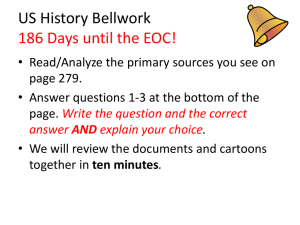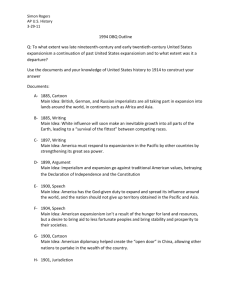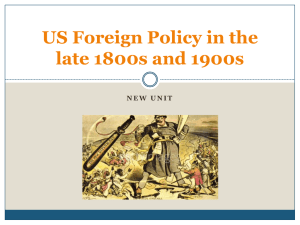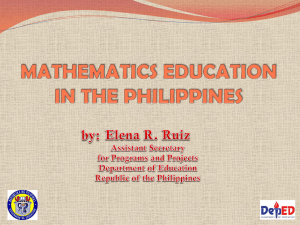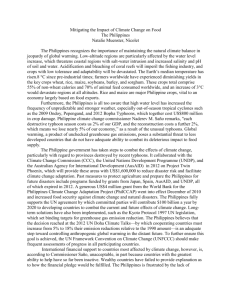DBQ Notes Prompt: Compare and contrast views of United States
advertisement
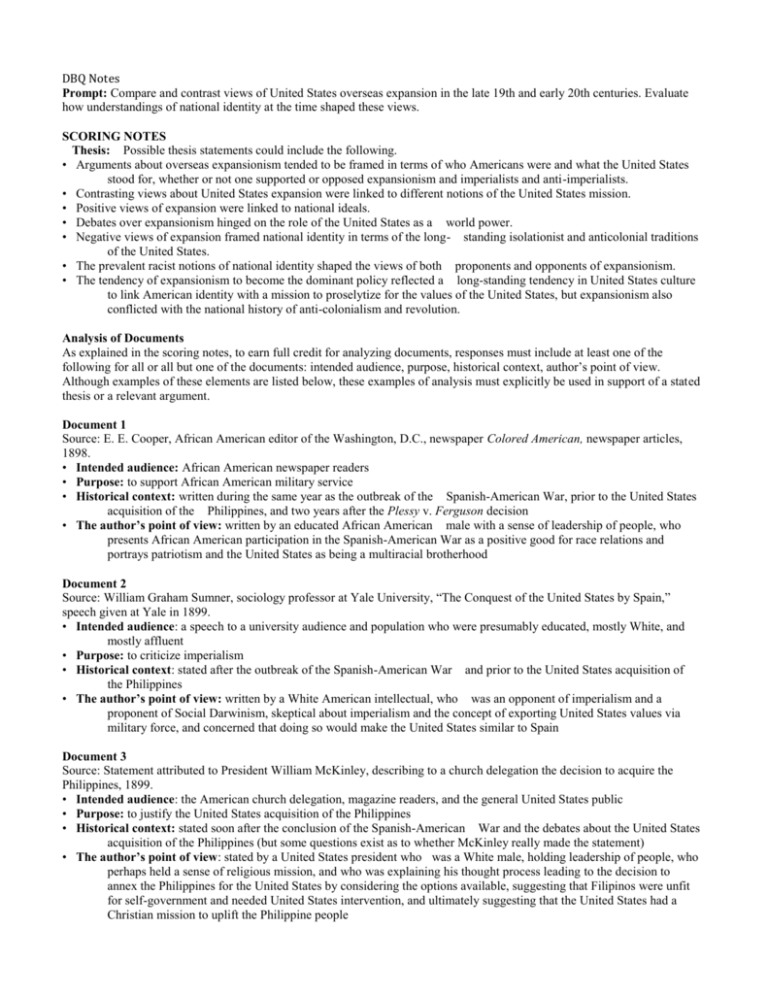
DBQ Notes Prompt: Compare and contrast views of United States overseas expansion in the late 19th and early 20th centuries. Evaluate how understandings of national identity at the time shaped these views. SCORING NOTES Thesis: Possible thesis statements could include the following. • Arguments about overseas expansionism tended to be framed in terms of who Americans were and what the United States stood for, whether or not one supported or opposed expansionism and imperialists and anti-imperialists. • Contrasting views about United States expansion were linked to different notions of the United States mission. • Positive views of expansion were linked to national ideals. • Debates over expansionism hinged on the role of the United States as a world power. • Negative views of expansion framed national identity in terms of the long- standing isolationist and anticolonial traditions of the United States. • The prevalent racist notions of national identity shaped the views of both proponents and opponents of expansionism. • The tendency of expansionism to become the dominant policy reflected a long-standing tendency in United States culture to link American identity with a mission to proselytize for the values of the United States, but expansionism also conflicted with the national history of anti-colonialism and revolution. Analysis of Documents As explained in the scoring notes, to earn full credit for analyzing documents, responses must include at least one of the following for all or all but one of the documents: intended audience, purpose, historical context, author’s point of view. Although examples of these elements are listed below, these examples of analysis must explicitly be used in support of a stated thesis or a relevant argument. Document 1 Source: E. E. Cooper, African American editor of the Washington, D.C., newspaper Colored American, newspaper articles, 1898. • Intended audience: African American newspaper readers • Purpose: to support African American military service • Historical context: written during the same year as the outbreak of the Spanish-American War, prior to the United States acquisition of the Philippines, and two years after the Plessy v. Ferguson decision • The author’s point of view: written by an educated African American male with a sense of leadership of people, who presents African American participation in the Spanish-American War as a positive good for race relations and portrays patriotism and the United States as being a multiracial brotherhood Document 2 Source: William Graham Sumner, sociology professor at Yale University, “The Conquest of the United States by Spain,” speech given at Yale in 1899. • Intended audience: a speech to a university audience and population who were presumably educated, mostly White, and mostly affluent • Purpose: to criticize imperialism • Historical context: stated after the outbreak of the Spanish-American War and prior to the United States acquisition of the Philippines • The author’s point of view: written by a White American intellectual, who was an opponent of imperialism and a proponent of Social Darwinism, skeptical about imperialism and the concept of exporting United States values via military force, and concerned that doing so would make the United States similar to Spain Document 3 Source: Statement attributed to President William McKinley, describing to a church delegation the decision to acquire the Philippines, 1899. • Intended audience: the American church delegation, magazine readers, and the general United States public • Purpose: to justify the United States acquisition of the Philippines • Historical context: stated soon after the conclusion of the Spanish-American War and the debates about the United States acquisition of the Philippines (but some questions exist as to whether McKinley really made the statement) • The author’s point of view: stated by a United States president who was a White male, holding leadership of people, who perhaps held a sense of religious mission, and who was explaining his thought process leading to the decision to annex the Philippines for the United States by considering the options available, suggesting that Filipinos were unfit for self-government and needed United States intervention, and ultimately suggesting that the United States had a Christian mission to uplift the Philippine people Document 4 Source: Jane Addams, social reformer, “Democracy or Militarism,” speech given in Chicago, 1899. • Intended audience: excerpt from a speech to an audience that is uncertain but were likely similar-minded supporters of social reform, isolationism, and peace • Purpose: to criticize the Spanish-American War and the militarism it encouraged in the United States • Social context: stated soon after the conclusion of the Spanish-American War and immediately after the United States acquisition of the Philippines and reflects urban perspective • The author’s point of view: stated by a White American female, who was a social activist and a progressive reformer based in Chicago and a pacifist who asserts that United States participation in the Spanish-American War had undermined support for ideals of peace and had possibly encouraged more violence among Americans on the streets of Chicago Document 5 Source: Theodore Roosevelt, “The Strenuous Life,” speech given to business owners and local leaders, Chicago, 1899. • Intended audience: excerpt from a speech to business owners and local leaders in Chicago, presumably White males who embraced a mainstream understanding of national politics • Purpose: to justify the United States acquisition of the Philippines • Historical context: stated soon after the conclusion of the Spanish- American War and immediately after the United States acquisition of the Philippines • The author’s point of view: stated by a White American male political leader (the governor of New York at the time), an advocate of assertive late-nineteenth-century masculinity, imperialism, and militarism, who expresses that the United States had an obligation to provide government for the Philippines and criticizes opponents of the acquisition of the Philippines as being fearful and “unwilling . . . to play the part of men.” Document 6 Source: William Jennings Bryan speech, campaign for the presidency, 1900. • Audience: an excerpt from a speech given while Bryan was campaigning for president to an audience that is unclear but presumably made up of his political supporters • Purpose: to condemn the United States acquisition of the Philippines, to make a case for ending colonialism, and to make a case for his own campaign for the presidency • Historical context: stated soon after the conclusion of the Spanish- American War and soon after the United States acquisition of the Philippines • The author’s point of view: stated by a White American male political leader (a United States representative from Nebraska at the time), an opponent of imperialism who was supportive of Populist ideas, critical of United States imperialism and condemnatory of United States colonialism but at same time, critical of the notion of incorporating Filipinos as citizens Document 7 Source: Puck, a satirical magazine, June 29, 1904. • Audience: a cartoon published on the cover of Puck, a satirical magazine whose audience is unclear but presumably the American reading public • Purpose: to humorously critique the irony of an American symbol of liberty encompassing non–United States territories and to suggest that American interests may be overextended • Historical context: published soon after the conclusion of the Spanish- American War and the United States acquisition of the Philippines and Panama and in the same year as the Roosevelt Corollary • The author’s point of view: unclear but seems to be critical of United States expansionism and presents the United States as a quasi-imperial power in the Western Hemisphere and as protective but with talons Analysis of outside examples to support thesis/argument Possible examples of information not found in the documents that could be used to support the stated thesis or a relevant argument could include the following. • The Monroe Doctrine, 1823 • The doctrine of Manifest Destiny • The formulation of the Roosevelt Corollary, 1904 • The American victory in the Spanish-American War leading to the following outcomes. • The United States acquisition of island territories • Expanded United States economic and military presence in the Caribbean and Latin America • The United States engagement in a protracted insurrection in the Philippines • Increased United States involvement in Asia o Widespread public support for expansionism in the late nineteenth century • The active role of the press in mobilizing support for expansionism (e.g., yellow journalism and William Randolph Hearst) • The opposition of some African American leaders to the war in the Philippines (e.g., W. E. B. Du Bois) • Knowledge of the details of expansionism in the Pacific and the Caribbean (e.g., how United States sovereignty was extended to Hawaii and Samoa) • Later events or topics related to United States overseas expansion • Dollar diplomacy • Moral diplomacy • The United States intervention in Mexico Contextualization: Students can earn a point for contextualization by accurately and explicitly connecting historical phenomena relevant to the argument to broader historical events and/or processes. These historical phenomena may include, but are not limited to, the following. Debates and policies about race, immigration, nativism, and United States society in the late 19th century Popular social-scientific theories including Social Darwinism and scientific racism Codification of Jim Crow laws (segregation) de facto and de jure in the late nineteenth century; race riots and lynching Rise of the Niagara Movement and the NAACP Growth of the Social Gospel in the late nineteenth century The Progressive reform movement The perception in the 1890s that the western frontier was closed Contemporary debates over late-19th-century and early-20th-century imperialism Yellow journalism and prevalent public support for expansionism The desire to have outposts and coaling stations in the Pacific to facilitate commerce in Asia The severe depression of the 1890s (the Panic of 1893) and the need to open up foreign commercial markets o Prior public support for the Cuban nationalists and revolutionaries o Distinctions in popular attitudes between support for the Spanish American War and greater opposition to the subsequent war in the Philippines The long history of the United States territorial expansion and conquest and debates over the United States role as a global power Isolationism, the Monroe Doctrine, and the Roosevelt Corollary Division of Africa on the part of European powers and imperial competition The naval buildup in Europe, the rise of imperial Japan, and the subsequent American response to increase naval power Arguments that Americans were destined to expand their culture and norms to others, especially the non-White nations of the globe The notion of Christian evangelism contributing to a duty to expand United States influence in the world Synthesis: Essays can earn the point for synthesis by crafting a persuasive and coherent essay. This can be accomplished providing a conclusion that extends or modifies the analysis in the essay, by using disparate and sometimes contradictory evidence from primary and/or secondary sources to craft a coherent argument, or by connecting to another historical period or context. Examples could include, but are not limited to, the following. Linking the argument to earlier debates about United States involvement in European affairs, from George Washington’s Farewell Address through the Monroe Doctrine Linking the argument to debates about territorial expansion prior to the Civil War, including issues surrounding the Louisiana Purchase and the Mexican Cession Linking the argument to later twentieth-century debates about expansionism and isolationism Linking the argument to the rise of the United States as a world power following the Second World War

